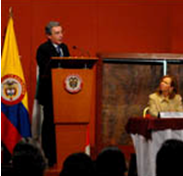Briefing note
Statistics play an important role in governance because they provide key data for evaluating accountability and transparency in public decisions. Improving them is vital for a well-functioning democracy.
This is the main underlying idea of the Fifth Meeting of the Statistical Conference of the Americas of the Economic Commission for Latin America and the Caribbean (SCA-ECLAC) taking place this week in Bogota, Colombia with the participation of over 50 delegates from 21 countries in the region and 33 representatives of almost 15 United Nations agencies and other organizations.
The meeting was inaugurated yesterday by the President of Colombia Álvaro Uribe, the Secretary of the Commission, Laura López -in representation of ECLAC Executive Secretary Alicia Bárcena- and the President of SCA-ECLAC and Director of the National Administrative Department of Statistics (DANE) of Colombia, Héctor Maldonado.
In his opening words, President Uribe stated that the scientific rigor, objectivity and independence with which statistical data is managed in his country are "a tradition that has become a hallmark of Colombian democracy."
The Colombian president highlighted the progress made in his country in terms of security, respect for freedoms, social cohesion, the independence of institutions and transparency, factors that directly influence public confidence in official statistics.
"Without truthful and trustworthy information, democratic systems turn pale," said Bárcena in a message read by López.
Bárcena stressed that the provision of statistics - which is in nature a public good- is a basic function of the State. "Statistics constitute a tool that contributes to the informed participation of citizens in public affairs and to social welfare because of their impact on the effectiveness and efficiency of public policies in every sphere," she said.
She warned that the credibility of official statistics is a fundamental asset for democratic development, and so must be permanently improved. This requires an "institutional framework that ensures independence in decision-making on statistics systems, absent of all influence not guided by professional criteria," added Bárcena.
The ECLAC Executive Secretary called on delegates to begin drafting a code of good practices on statistics for the region during the meeting this week. Its main objective would be to reaffirm countries' commitment to the strengthening of the legal, institutional and administrative frameworks of their national statistics systems.
Maldonado asserted the need to count with this code of good practices "to give way to credible, trustworthy statistics that comply with the standards of quality required for government management and, in general, strengthen democracy and promote the economic, social and environmental development of our countries."
The SCA is a subsidiary body of ECLAC that promotes the development and improvement of national statistics - working to ensure that they are comparable internationally- as well as international, regional and bilateral cooperation on statistics in the region.
The three-day meeting to be held 11-13 August includes three seminars on the development of national statistics systems, the census round 2010, and the use of administrative records for statistical purposes.
Participants will also discuss the proposal of the SCA-ECLAC's biennial programme of regional and international cooperation activities 2009-2011, which has among its objectives institutional capacity-building, promoting the training of competent human resources, the promotion and development of technical and methodological capacities, and promoting international coordination and cooperation.



